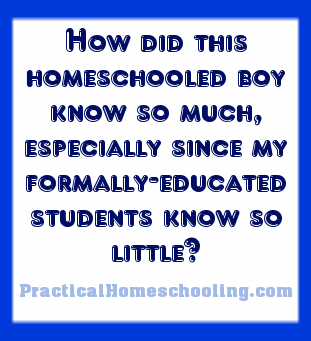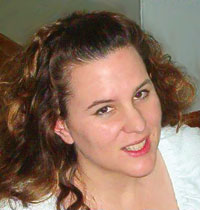What a Difference Homeschool Makes!
By Michelle Dalrymple
Printed in Practical Homeschooling #61, 2004.
 College instructor Michelle Dalrymple tells us what she learned about the difference between traditionally schooled and homeschooled students.
College instructor Michelle Dalrymple tells us what she learned about the difference between traditionally schooled and homeschooled students.

|
 |
 As a homeschooling mom, I am also a part-time college instructor, and I get to see the benefits of homeschooling from a completely different angle than most parents. I teach English lit and composition for a local community college. Twice now, I have had a homeschooled student in my class and the difference between homeschooled students and public school students is utterly remarkable.
As a homeschooling mom, I am also a part-time college instructor, and I get to see the benefits of homeschooling from a completely different angle than most parents. I teach English lit and composition for a local community college. Twice now, I have had a homeschooled student in my class and the difference between homeschooled students and public school students is utterly remarkable.
Let me give you, the homeschooling parent, some great news: Even if you are doing the most miserable job schooling your child and he/she is learning nothing (doubtful), you are doing a better job than most public schools. Think I jest? Here is one of my most memorable experiences with a publicly schooled student. We shall call him Dave.
I found it hard to believe, but Dave completely baffled me. For a student to make it through four years of high school and be totally incompetent seemed inconceivable. Most remarkable was the fact that Dave could not write a complete sentence. He had absolutely no concept of putting a subject with a predicate, even at the most basic level. Something like "The cat ran" eluded him. At times I thought to myself, I know he can speak - can't he hear what a sentence sounds like when he talks? When his friends talk? Does he hear it on TV at least? Has he ever read a magazine, a letter from a friend, a credit card offer? Each of those uses a complete sentence; why can't he? What further baffled me was that Dave actually graduated from high school. A public official confirmed that Dave "knew" enough to have a diploma. Knew what? He certainly didn't know enough to write a sentence; what does one have to know to graduate?
Thus, each week I would sit there, Dave's paper in hand, and pity this poor, 18-year-old boy who knew so very little and most assuredly would not, could not, go far in life.
 Fast forward six years to my one of my homeschooled students. From his first paper I could tell he was bright and had an excellent grasp of the written language. He was only 17, trying community college as "practice" for the college he would attend in a year, and was, at first, very quiet. This, wonderfully, changed over the semester, and by the middle of the term, he was laughing and making "English" jokes with me in class.
Fast forward six years to my one of my homeschooled students. From his first paper I could tell he was bright and had an excellent grasp of the written language. He was only 17, trying community college as "practice" for the college he would attend in a year, and was, at first, very quiet. This, wonderfully, changed over the semester, and by the middle of the term, he was laughing and making "English" jokes with me in class.
I had noticed he understood the grammar and mechanics of writing at a completely higher level than most of my students. Typically, I use more "common" language to make many of the more "boring" aspects of writing more practical and understandable. However, this student, "Allan," would ask deeper, more technical questions than most other students could grasp.
I didn't understand how truly different Allan was until he asked me to look at a part of his paper he was writing. It dealt with using a comma around his sister's name, and I used the phrase "renaming the noun" since that is something most students could easily grasp. Then Allan exclaimed, "Oh, like an appositive!" and I think I nearly fainted. I have NEVER had a student able to identify a technical aspect of writing like that. I didn't even know what an "appositive" was until I was a tutor in my third year in college, and this 17-year-old used the word like it was everyday slang.
Later in the semester, after Allan had opened up and would stay after with a few other students to chat, I asked him if his parents made him study a Writer's Guide - a chapter a week maybe - to have such an excellent grasp of English language. He just shook his head and laughed it off. "Nothing formal like that," he responded. Those words rang in my head like a bell. Nothing formal.
So often we homeschooling parents worry that we aren't doing enough; we need to "buckle down"; we need to do more. After this semester, however, I just look at Allan, with his "informal" education, and Dave, a product of four years of public school, and I know what I want my children to learn. Nothing formal.